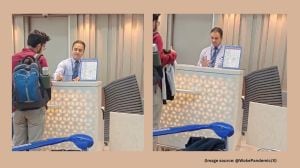Stay updated with the latest - Click here to follow us on Instagram
2000 crime weapons,11 foetuses: samples pile up at Kalina lab
The Forensic Science Laboratory (FSL) in Kalina is facing an unusual challenge of storing and disposing of the samples and exhibits that come to it for investigation.
Officials say they send reminders every few months but no one returns to re-claim them
The Forensic Science Laboratory (FSL) in Kalina is facing an unusual challenge of storing and disposing of the samples and exhibits that come to it for investigation.
Samples like cloths and foetuses and suspected crime weapons like swords,daggers,lathis,sickles,etc. are piling up at the laboratory as no one returns to claim them after getting the report. At present,the lab has around 1,500 to 2,000 weapons that investigators had sent in the last five years. Moreover,with many cases pending in court and investigators refusing to collect these crime exhibits,the FSL is in a dilemma regarding their disposal.
After every crime,weapons used to commit it,ranging from knives to sticks and stones,are sent to the lab for testing. After we conduct tests and dispatch the results we clearly mention in the document that the police should come and collect the exhibits within a fortnight. We send reminders every few months,but more often than not,the exhibits remain with us and no one returns to claim them, said an official of FSL,Kalina.
Even though we may have submitted our results,the case drags on in court and the exhibits lie in our storage. It takes several years for the case to reach the court and till the time,the judge asks for the exhibit to be produced before him,it lies with us. We cannot dispose them of till the case reaches its final decision and hence are forced to store them, the official said.
Besides weapons used in crime,cloth forms a sizeable chunk of non-biological exhibits being stored by the lab. Garments and cloth of various kinds are sent as exhibits as there may be traces semen or blood on them that may serve as evidence. We have to store such exhibits also as long as the case is sub-judice, the official added.
The rise in crime over the years has also led to an increase in number of samples the lab receives. We have two storage rooms for non-biological exhibits: one for those that have already been tested (mostly of priority cases) and the other for those that are yet to be tested, the officials said.
The lab is facing a similar problem with biological exhibits that are kept in a designated cold storage area in the lab after DNA tests. DNA testing in this lab began in 2003. Ever since,none of the exhibits,approximately 50-60,have been disposed of. Sometimes the court raises doubts on test results and demands a fresh DNA test,so we cannot afford to dispose them of, said the official.
The lab has about 11 foetuses sent to it over the years for DNA testing. DNA tests are usually done when abandoned foetuses are found or in rare cases where paternity has to be proved. However,now we insist that the doctors send us isolated samples from the foetuses rather than the whole foetus. The viscera that is sent to us is disposed of through incinerators and we have asked for the BMCs
permission to do the same with the foetuses too, the official said.







